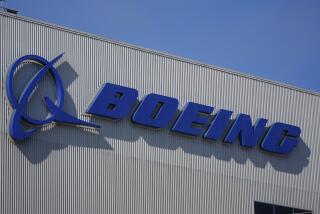UAL Board Accepts Pilots’ $6.75-Billion Buyout Offer
- Share via
UAL Corp., the parent of United Airlines, accepted a $6.75-billion bid from its pilots and the company’s management Thursday, clearing the way for the largest buyout ever of an American company by its employees.
The deal, worth $300 a share, would also give a stake in the airline to British Airways, bringing the strong transatlantic carrier closer to its goal of becoming a global airline.
Although the buyout still faces obstacles, it would represent a victory for United’s pilots’ union, which tried without success to buy the airline two years ago. It also would be a triumph for UAL Chairman and Chief Executive Stephen M. Wolf, who spearheaded the pilot-management coalition to avoid a takeover by Los Angeles investor Marvin Davis.
How strongly other United employees support the transaction is still a question. The airline’s largest and most militant labor group, the International Assn. of Machinists, said that the debt-financed deal threatens the airline’s future and “jeopardizes the livelihoods of the work force.”
And a group that claims to represent United’s 40,000 non-union employees is considering legal action to stop the transaction. The group, called Coalition Acting for the Rights of Employees, is angry that the airline can unilaterally cut its wages to finance the deal.
Sources in the financial community said Thursday that the disagreements with the machinists and the non-contract employees could threaten the proposed buyout, if it is not resolved.
United is the nation’s second-largest airline, next to American Airlines. It was an attractive takeover target because it operates valuable Pacific routes and owns, rather than leases, a large fleet of aircraft. Airline industry analysts have said that a buyer can easily finance a bid by borrowing against United’s airliners and landing slots.
Wolf, in a statement, said that the buyout not only would “secure the future of United Airlines and its employees” but it would “provide the best value to shareholders.”
“As the largest U.S. employee-owned company,” he continued, “United Airlines will keep its tradition of quality service and combine it with a new entrepreneurial vigor.”
Currently, the largest American company owned by its employees is Avis Corp., the rental car company. Other companies, such as J. C. Penney and Delta Air Lines, have sold stock to employees, but not enough to grant control.
Unusual Provisions
The agreement between the UAL board and its employees contained some unusual provisions that indicated the battle for the airline might not be over just yet. The board instructed its advisers to talk to any other possible buyers and provide them with information needed to make an offer. The board’s advisers are First Boston Corp., a New York investment bank, and the New York law firm Davis Polk & Wardell.
The buyout offer doesn’t contain any so-called “lock-up” agreements that have become standard in highly contested takeover battles. By giving the buyer the right to buy a company’s most valuable possessions cheaply, these agreements discourage other bidders.
These provisions apparently leave the door open to a new bid from Davis, and to other possible buyers. Also said to be interested in UAL is Texas investor Robert M. Bass, who, according to a source, held discussions this week with the machinists’ union.
Davis Still in Bidding?
Davis, the billionaire oilman, triggered the battle for UAL six weeks ago when he offered to buy it for $240 a share, or $5.4 billion. He later raised his bid to $275 a share, and he said that he might go higher after he reviewed UAL’s confidential financial documents, such as leases and other contracts.
But Davis indicated early Thursday that he wasn’t prepared to raise his bid since he hadn’t completed his examination of UAL’s books. After the agreement was announced Thursday, however, he had no comment.
This is the second time an airline has apparently slipped by Davis, the former owner of 20th Century Fox. Earlier this year, he tried to buy Northwest Airlines, but was outbid by Los Angeles investor Alfred A. Checchi.
The labor-management proposal would give employees a 75% stake in the airline. Management, including Wolf, would get 10% and British Airways would get a 15% stake. Although the pilots are the only labor group among the buyers, United’s flight attendants said Thursday that they reviewed the proposal and might participate.
The labor-management proposal would reportedly be financed with $7.2 billion loaned by a consortium of banks led by Citibank and Chase Manhattan. The funds would be used to finance the transaction and refinance some of UAL’s $1.2-billion debt.
In addition, British Airways would contribute $750 million in return for preferred stock, and the pilots’ union would contribute $200 million from its pension fund. It would also receive preferred stock in return. Management, including Wolf and UAL Chief Financial Officer John C. Pope, would contribute $15 million.
The pilots have also said that they would contribute another $250 million in wage concessions and increased productivity. The machinists, however, say that the figure is inflated. For example, $40 million of the pilot contribution isn’t cash, but credit for lost wages during the 1985 strike. The machinists don’t think lost wages should count as equity.
Louis R. Schroeder, president of District 141 of the International Assn. of Machinists, said in a letter to UAL’s board that the machinists have “no alternative other than to take all actions available to aggressively protect our members against its negative ramifications.”
The machinists could mount a legal challenge to block the transaction, or they could strike after their contract becomes amendable next month.
In trading Thursday on the New York Stock Exchange, UAL’s stock closed at $280.50, down $2.75.
More to Read
Inside the business of entertainment
The Wide Shot brings you news, analysis and insights on everything from streaming wars to production — and what it all means for the future.
You may occasionally receive promotional content from the Los Angeles Times.










